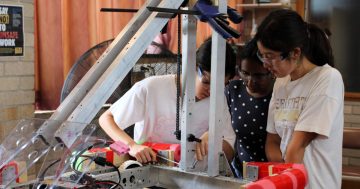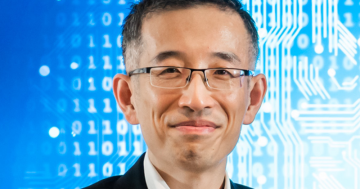
People learn most rapidly when the learning is relevant to them and when they take responsibility for it. Photo: File.
Michelle Gibbings says employees who want to keep ahead of an ever-changing workplace need to be proactive in their search for the relevant knowledge to expand their skills base.
If someone were to tell you that in less than five years your skills would be 50 per cent less relevant than they are today, would you believe them?
You should, because it’s suggested that the ”half-life” for skills, in general, is around five years, while for technical fields it’s half that.
In their article Reskilling in the Age of AI, Assistant Professor Jorge Tamayo and colleagues suggest this rapid skill-shift pace means that upskilling won’t be enough.
Instead, much of the focus will need to be on reskilling as roles disappear or fundamentally change.
As I’ve written about before, AI will change not just what you do but how you do it. A recent study examined how new technology impacts workers and their earnings. The researchers found the effect varied based on whether the technology could perform a task ”in place of a worker” versus ”complementing workers performing a task”.
It was the latter that created more variability, such that ”the most experienced and highly paid workers suffer, while new hires appear to benefit”.
They concluded that AI could level the playing field within an occupation and the people who would be most impacted were employees who were currently rewarded for being good at their jobs.
The good news is that these findings reinforce what I’ve been saying for years: that the so-called ”soft skills” (such a misnomer) have become more critical than ever.
AI cannot replace the human-to-human connection. In fact, the research found that roles that relied on interpersonal skills were hardly affected by technological change.
It reminds me of the comment from the author of Freakonomics, Stephen Dubner: “There’s an old saying that knowledge is knowing a lot of facts and wisdom is knowing which facts matter.”
You already know that if you want to be at the top of your game, you must be abreast of the latest thinking and ideas from your profession and complementary professions.
It’s time to challenge yourself: When was the last time you proactively decided to learn something new? Last week? Last month? Last year? Or is it so long ago that you can’t remember? I’m not talking about something your organisation paid for you to do, or a course it sent you on. I am referring to learning that you decided for yourself was necessary.
It could have been learning purely for enjoyment because you wanted to master a new craft. It might have been expanding a skillset or acquiring a whole new set of skills because you wanted to expand your knowledge and skills base.
People learn most rapidly when the learning is relevant to them and when they take responsibility for it. The choice is yours as to which direction you travel with your learning. Consider this
as your investment in your future employability and progress.
Some learning might have a cost tag, while others won’t. All learning, however, involves time, but consider the cost to your career of not being proactive and taking charge.
As we age, we can become more reluctant to try new things and do things differently. We can become more stuck in our ways and avoid learning or tasks where we might fail. Remember, the best indicator that you’re learning something new is when you feel uncomfortable.
Your discomfort is just your brain’s way of alerting you that you’re doing something your brain hasn’t done before (or done frequently).
So, go for something other than learning that’s too easy. You can challenge yourself and enjoy it at the same time. For example, you can read a book on a topic different from your day job. You can attend a lecture (there are lots of free or low-cost ones available).
Subscribe to online news services to stay updated on global information, new issues and key trends. Set up Google Alerts on topics that you are interested in so you know when new content becomes available.
The options start with you, and the choice ends with you, too.
*Michelle Gibbings is a workplace expert, the award-winning author of three books, and a global keynote speaker. She’s on a mission to help leaders, teams and organisations create successful workplaces – where people thrive and progress is accelerated. This article first appeared at https://www.changemeridian.com.au/latest-news/.











